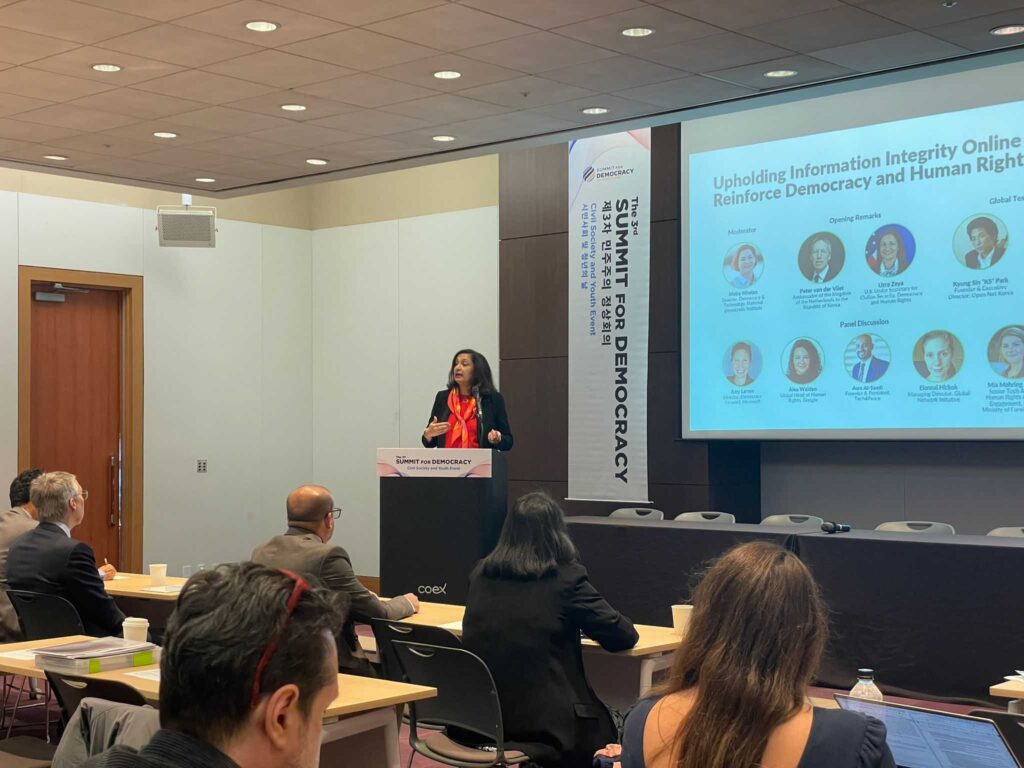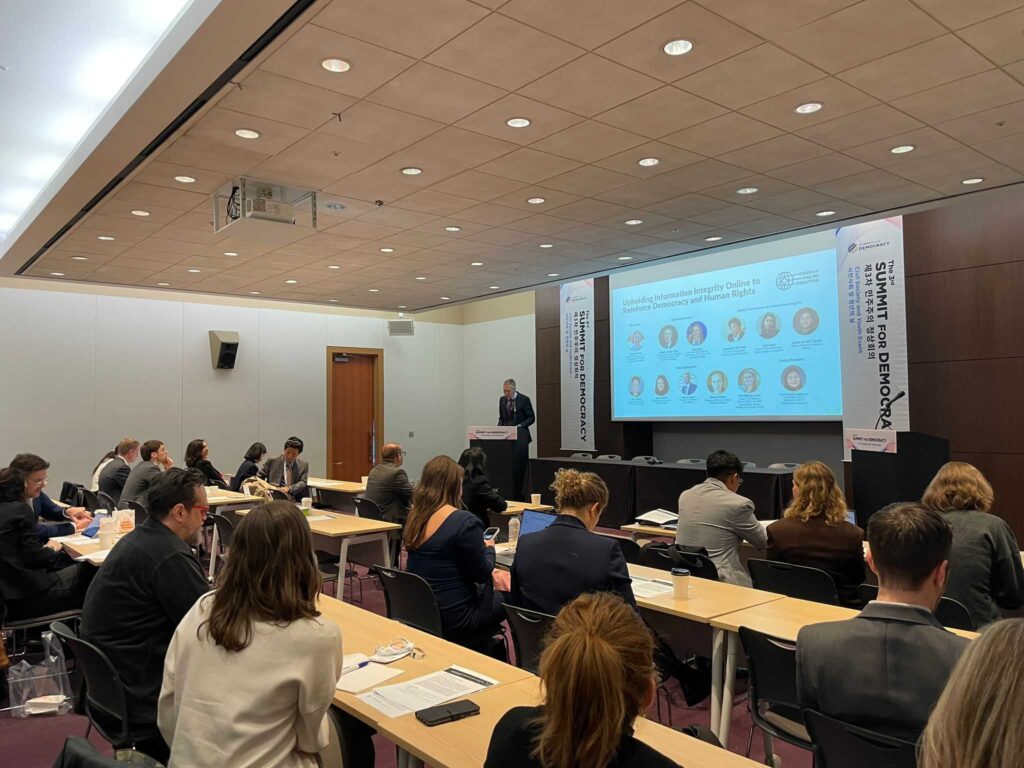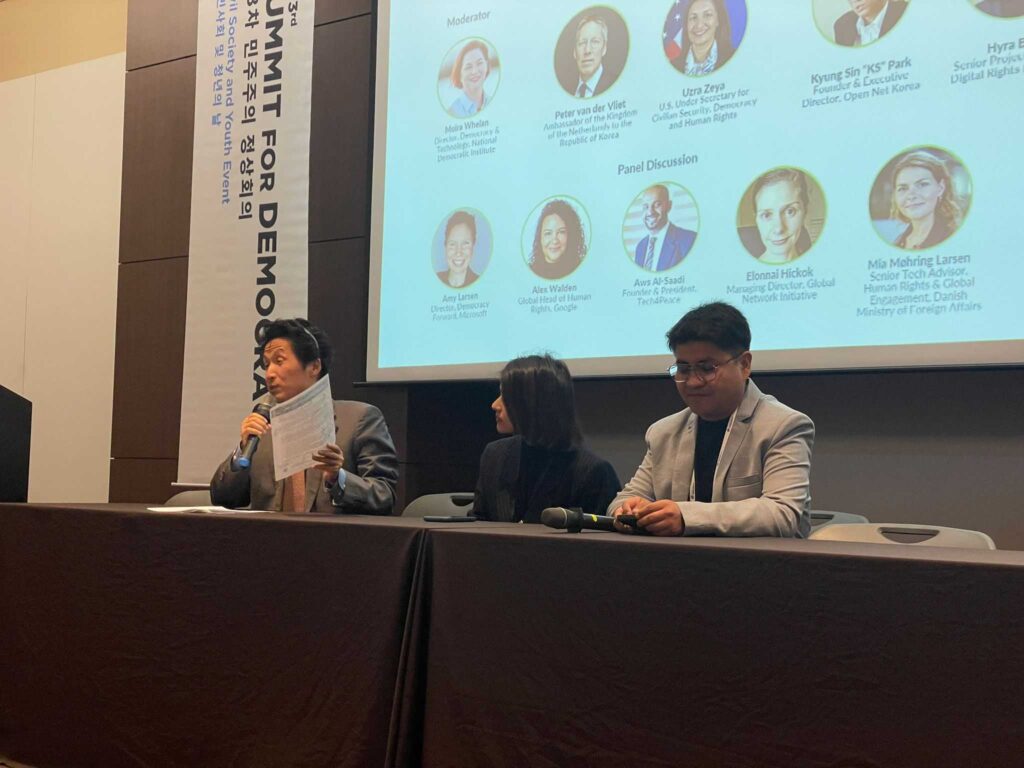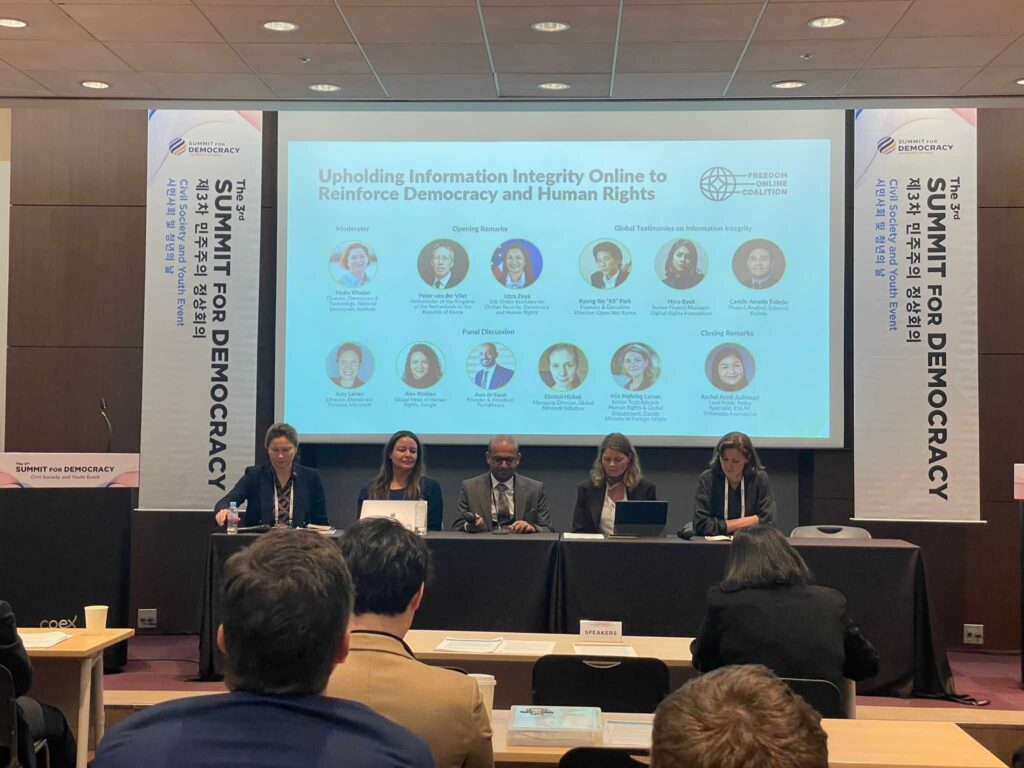On Tuesday, 19 March during Day 2 of the Summit for Democracy, the co-Chairs of the Freedom Online Coalition’s (FOC) Task Force on Information Integrity Online (TFIIO), Denmark, the Netherlands, and the Wikimedia Foundation, hosted a multistakeholder session titled “Upholding Information Integrity Online to Reinforce Democracy and Human Rights.”




The session was moderated by Moira Whelan, Director, Democracy & Technology, National Democratic Institute, and opened with remarks from high-level representatives of the Netherlands, 2024 Chair of the FOC, and the United States. Peter van der Vliet, Ambassador of the Kingdom of the Netherlands to the Republic of Korea, underscored the challenges related to the online information ecosystem, such as the spread of misinformation which undermines human rights and democratic values, and the importance of leveraging digital technologies for the enjoyment of human rights, especially during election cycles and in the context of 2024 as a super-election year.
The Ambassador announced the publication of the FOC’s Joint Statement on Information Integrity Online and Elections, and highlighted the Coalition’s call for States to take action by strengthening the online information ecosystem, and promoting a pro-democratic vision and respect for human rights. Furthermore, the Ambassador noted that the Coalition urges online platforms and the broader tech industry to take the necessary measures to ensure trustworthiness of their services and products.
U.S. Under Secretary for Civilian Security, Democracy and Human Rights, Uzra Zeya, noted that reliable information is foundational for both democracy and public life, and is endangered by the erosion of trust and integrity in the digital information sphere. The Under Secretary drew attention to acts by maligned State and non-state actors to use disinformation as a means for undermining the policies of democratic societies, in addition to influencing people’s beliefs and political participation. Furthermore, such acts seek to increase societal exclusion and divisions, including through online and offline harassment, threats, or fabrications to keep marginalised communities from engaging in political processes. The Under Secretary also drew attention to U.S. led initiatives to work with partners to combat threats to the online information environment, such as building a common understanding of the threat of information manipulation and to build capacity for rights-respecting responses.
The opening remarks were followed by global testimonies on information integrity provided by civil society stakeholders Kyung Sin “KS” Park, Founder, Executive Director, Open Net Korea; Hyra Basit, Senior Project Manager, Digital Rights Foundation; and Camilo Arratia Toledo, Project Analyst, Internet Bolivia. Panellists highlighted challenges in various regional contexts including the impact of deep fake content developed with generative AI, the spread of gendered disinformation, content censorship, and the use of Internet shutdowns to restrict access to information during election periods. The need to work towards an inclusive information system, strengthen civil society, address linguistic diversity of societies and historic inequalities when advancing digital inclusion, in addition to the importance of enhancing media literacy and developing tools with trustworthiness, were highlighted as areas of focus in promoting information integrity globally.
The session also featured a multistakeholder panel discussion with Amy Larsen, Director, Democracy Forward, Microsoft; Alex Walden, Global Lead for Human Rights, Google; Mia Møhring Larsen, Senior Tech Advisor for Human Rights & Global Engagement, Ministry of Foreign Affairs of Denmark; Elonnai Hickok, Managing Director, Global Network Initiative; and Aws Al-Saadi, Founder & President, Tech4Peace. The discussion opened with insights on the spread of disinformation in Iraq, efforts to fact-check content shared online, and an emphasis on the importance of investing in education and media literacy for citizens.
The panel highlighted the importance of including civil society, especially from the global majority, in initiatives working on information and election integrity to ensure a diversity of perspectives. The expansion of existing initiatives and further collaboration with key actors involved in the electoral process such as electoral officials, in addition to ensuring a holistic approach, scaling commitments across jurisdictions, fostering coordination, and reflecting on the effectiveness of established initiatives, were also noted as important factors.
Panellists from the private sector noted ongoing efforts to help voters access reliable information, equipping users with enhanced digital security, and protecting platforms from abuse as key priorities, in addition to ensuring new technologies are used to promote democracy and human rights rather than be used for harm.
While exploring the progress that can be achieved in the coming year, the panel highlighted the opportunity to focus on inclusive and affirmative conversations that convey a positive vision for the online information ecosystem and are less fear-driven. In addition, the panel noted that they would like to see active involvement of political parties and parliaments in these discussions; strengthened multistakeholder collaborations and spaces for dialogue to address localised challenges effectively; the provision of guidance to support users in navigating the information environment; and continued efforts to increase connectivity and ensure more people are able to contribute to positive and democratic dialogue.
Closing remarks were provided by Rachel Arinii Judhistari, Lead Public Policy Specialist, ESEAP, Wikimedia Foundation, and co-chair of TFIIO, who highlighted Wikipedia’s model of collaborative, inclusive, and transparent information sharing, and reaffirmed the need for a strengthened online information ecosystem which respects pluralism, diversity, inclusion, safety and security, and promotes access for users and citizens worldwide.
